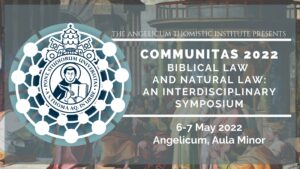On the Unity of the Two Testaments: In What Sense Is the Torah a Law for Christians?
Justin Schembri, O.P.
Pontifical University of St Thomas Aquinas – Angelicum
The title of my talk is “On the Unity of the Two Testaments: In what sense is the Torah a law for Christians?” This talk will claim that the ultimate aim of biblical law for Christians is the identity-forming covenant commitment with Jesus Christ embodied in the call to holiness. What this would imply is that any real understanding of biblical law cannot be done through the statutory approach to law but rather through the common law approach; in forming a system of reasoning, biblical law is essentially customary law based on judgements that a judge would make making recourse to the repository of known customs and accepted norms. In other words, biblical law, based on common values and a common story, explains who Israel is and not just what Israel does. In this case, we are required to examine the story or metanarrative of the scriptures. Such a metanarrative, revolving around the call to holiness, is not cancelled or removed with the coming of Christ. Therefore, I will sustain that both testaments agree that righteous living is a matter of the heart and living in wholehearted union with God. However, this does not mean that the dawning of Christ has not “updated” many of the laws in the OT; but this “updating” is typical of biblical law based on practices characteristic of the common law approach found throughout scriptures.
Fr. Justin Jude Schembri, O. P. was born in Windsor, Ontario, Canada on February 25 th , 1981. At the age of 16, he left Canada with his family, who returned to their home country of Malta. He entered the Maltese Province of St. Pius V of the Dominican Order in September 1998. He studied Philosophy at the University of Malta between 2001-2004 and then Theology at the Facoltà Teologica dell’Emilia Romagna in Bologna, Italy between 2004- 2007. Upon successfully finishing this degree, he was ordained a priest on July 1, 2007. After a year of pastoral activity, he studied scriptures at the Biblicum in Rome in 2008 and obtained the SS.L in 2012. Afterwards, he started and completed his doctorate at the Pontifical university of St. Thomas Aquinas (also known as the Angelicum) in 2018 where he is currently teaching biblical theology full-time. His area of specialization is the Synoptic Gospels but also is interested in Biblical Greek, Creation Theology, Biblical Wisdom and the Prophets.








